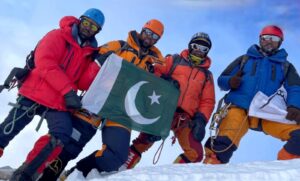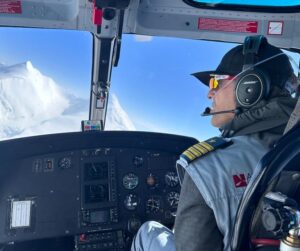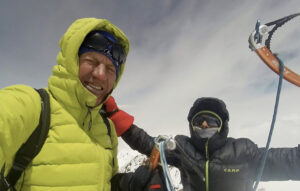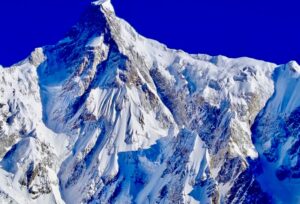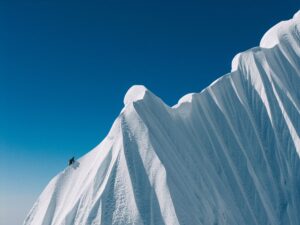This past summer, we covered Jeff and Priti Wright’s unsuccessful attempt on Pakistan’s K7 Central. However, there were other teams in the area: French climbers Charles Dubouloz, Clovis Paulin, Aymeric Clouet, and Lise Billon; plus American Tad McRea and Tom Livingstone of the UK.
Although neither succeeded on these difficult objectives, the two groups shared some details after they returned home.

The remote K7 area.
Why not K7?
“A beautiful pillar on K7 in Charakusa Valley caught our eye,” Lise Billon wrote. “This place has been explored a bit already, so it was quite easy to find information. Logistics are easy there, and all reports said that it is a beautiful place, with unbelievable mountains. It was the perfect fit for us because we didn’t have much time.”
While Billon and Clouet were in the planning stage, they found out that Dubouloz and Paulin, also living in the Chamonix Valley, had exactly the same goal. After some initial hesitation, they decided to join forces.
Meanwhile, Livingstone and McRea found that the general appraisal of the beauty of Charakusa Valley was true.
“What a place,” Livingstone said, “from granite bouldering to 7,000m peaks and everything in between.”
After a closer look, the climbers found out that these big mountains wouldn’t be easy. They were all protected by heavily crevassed glaciers, and the peaks themselves were difficult. “K7 West, K7, K6 West, and Kapura all became complicated objectives, quite different to how they appeared in the photos,” Livingstone said.
The long-awaited weather window
Both teams acclimatized on Sulu Peak but only met at Base Camp. Bad weather was waiting and tested the climbers’ patience for weeks. Finally, some optimistic forecasts launched the teams toward their goal.
“We didn’t have a crystal clear plan about what we wanted to climb, rather Plan A, B, and C,” Livingstone recalled. “We knew we wanted to get to a summit, but since these attempts/ascents involve so much unknown and often take multiple attempts, we had to stay flexible.”
Finally, the pair chose K7, gathered supplies for six days, and set off.
The French team also did their best to keep active on day climbs until they finally saw a weather window and set off for K7’s pillar.
“We carried gear to the foot of the pillar and set some pitches. We also decided to climb as a four, thus increasing our summit chances,” Dubouloz wrote. “On July 30, we launched the push on K7’s main pillar. The whole climb (including the pillar and the summit ridge) is six kilometers long and 2,400 vertical meters, culminating with the 6,934m summit.
The climb: Dubouloz
“The climbing was beautiful, the rock remarkable,” Dubouloz said. “We climbed demanding but magnificent pitches. We climbed slowly because we were very heavily loaded at the beginning but everything was going according to plan…until clouds closed and wrapped us in swirling snow.”
From that point, the climb turned into a struggle in bad weather. There were soaked climbing shoes on wet rock and wet bivouacs full of hope for better days that never came.
Dubouloz revealed that to save weight, Clovis insisted on taking only one down sleeping bag for the two of them. “I love my friend but all these super tight nights have sometimes been long,” Dubouloz admitted. He also posted a short but descriptive diary:
🔹️Day 1: A very long day of climbing, snow from midday. Stopping the climb around 9 pm on a shaky ledge. Average bivouac.
🔹️Day 2: Snow in the morning then, nice, snow again! We can’t progress because of the humidity so we fix the ropes. Five-star bivouac.
🔹️Day 3: Beautiful morning, then Aqualand in the afternoon! Soaked.
🔹️Day 4: Same as the day before. Anthology chute with lengths of mythical ice, still under the snow.
🔹️Day 5: “The snow is falling,” as Salvatore Adamo would say. However, in his song he doesn’t talk about storms.
🔹️Day 6: Descent, disappointed, return to Base Camp, unlimited fries to console yourself. Gloomy atmosphere and weather.
Here is a short video of the climb:
The climb: Livingstone
The climbers spent the first night at the base of K7’s south face. In the morning they started up the couloir (also taken by Hayden Kennedy, Urban Novak, and Kyle Dempster during their attempt in 2011 and ascent in 2012). All went well until the sun hit the ice wall and made conditions too dangerous.
On day three, in worse weather (but better ice conditions), they reached the col at the top of the couloir. There, they considered whether to follow the east ridge to K7’s main summit or go for nearby K7 Central.
“We looked down from the col. On the other side was a giant flat area. And wait a second…in the distance, when the clouds cleared, we could see two figures pop up from the north side of K7. It was Jeff and Priti Wright, at the same moment as we arrived. They’d made a long loop around the northern side of the mountain, just like in 2022, and were on their tenth day out from Base Camp,” Livingstone wrote.
Livingstone and McRea decided to go for K7 Central and, after a night in the flat area on the other side of the col, they approached the base.
But by the evening, Livingstone started showing symptoms of snow blindness. The following day, conditions on the face were far from ideal but they could see a line that could lead them to the top of the 200m spire. Unfortunately, Livingstone was not getting any better.
They still tried, with McRea leading three pitches up K7 West, before discussing the pros and cons and finally admitting they had to bail.
“I think we made a good call, a safe call. The most important thing is to come back, and as friends,” Livingstone wrote. All the very well-written reports can be followed through Livingstone‘s Instagram profile, including one about the descent, yet to be published.

